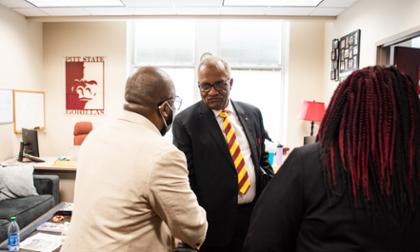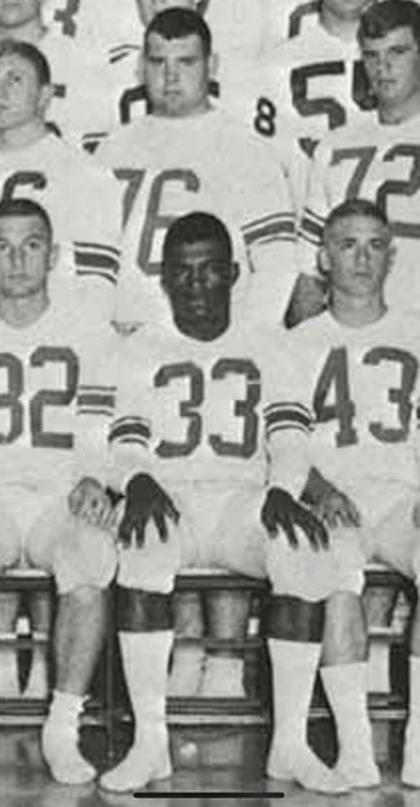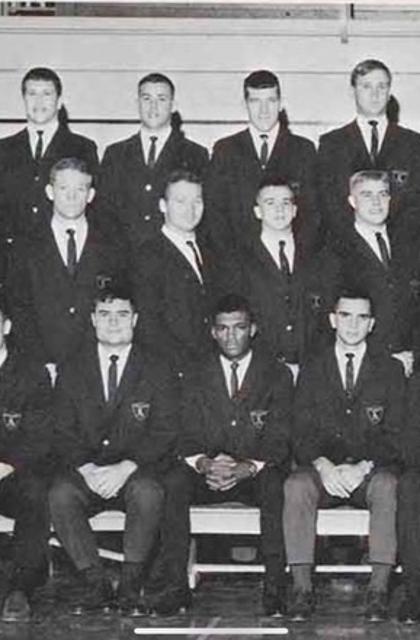Now with a long list of nationally notable achievements and awards, he serves on numerous boards including the NAACP’s National Housing Committee and is chair of the Washington DC NAACP Housing Committee. He is vice treasurer of the Leadership Council for Healthy Communities.
On Thursday, he added another award to the list: The prestigious Meritorious Achievement Award, given by Pittsburg State’s Office of Alumni & Constituent Relations in an afternoon ceremony at the Wilkinson Alumni Center. He also toured campus and met with students, faculty, and President Steve Scott, and with staff in the Office of Diversity.

May grew up in Kansas City, Missouri, and had aspirations of playing college football. He accepted Pittsburg State’s offer because of the coach, Carnie Smith. But breaking his leg as a freshman starter during the Homecoming game forced him to re-examine what he wanted out of life.
“I knew I wasn’t good enough, big enough, or fast enough to play professional football,” he said. “I enjoyed the game and my teammates, but this was at the beginning of the Civil Rights Movement and other things were in store for me. I arrived at Pitt State as an athlete-student and became a student-athlete.”

He was no stranger to discrimination; his family was the first Black family on their block in Kansas City.
“I recall vividly after playing with a neighbor boy for three or four days, his family moved away,” he said.
In high school as a member of the NAACP Youth Council, he participated in the march on the Missouri Capitol, advocating for better public accommodations.
“I was pelted with rocks, bricks — hit in the head,” he said.
As the oldest of seven and first to go to college, he had no idea what to expect at college in a small, predominantly white town like Pittsburg.

“My first year, I stayed in the dorm with a friend from high school, and one of our white dorm mates invited us to go downtown for a drink with white students we were friends with,” he said.
The year was 1965; the year prior, the Civil Rights Act had made segregation illegal in public places.
“The bartender didn’t refuse to serve us, but he refused to serve the white students who accompanied us,” May recalled.
He and other Black students — which then totaled close to 300 — bonded as they confronted discriminatory situations regarding campus housing, employment, and other challenges.
A faculty member, Dale Frihart, provided a transformational moment for the sociology major.
“He became my mentor and showed me that before you can make changes, you have to understand how things work,” May said. “You can’t just get angry – you have to develop strategies to address change. He caused me to understand movements.”
Frihart also helped May get appointed to the Pittsburg Human Relations Commission.
“I could see how groups and organizations make decisions, how things occur based on interactions between participants, how you leverage positions and relationships to arrive at a conclusion of things you want to see happen,” May said.
May and his friends formed the Black Student Movement Organization, and he settled on Civil Rights as a career path and lifelong journey.
As captain of the football team, another moment spurred him on: after a game in Tahlequah, Oklahoma, he and the coach went inside a restaurant to meet with the manager about reservations, and May was told by the manager that he’d have to enter the back of the restaurant and eat in the kitchen.
“Coach turned to me and asked, ‘What do you want to do?’ I said, ‘If I’m not going in the front door, you’re not either,’ and coach agreed, and so did my team, and we got back on the bus and left,” May said. “I would never subject myself to discrimination knowingly and accept it.”
May earned his bachelor’s in sociology and history in 1970, and his master’s in 1971.
Armed with what he’d learned from his mentor, Frihart — who taught him that to engage as a change agent, you’re more likely to be successful in bringing about meaningful change from the inside, not the outside pushing back — May got a job in the Kansas City Regional HUD Office and became a decision maker.
Over the next three decades, he would become the Region Seven Fair Housing Equal Opportunity Regional Director, named a “Change Agent” for the national Management Reform Initiative, served as Acting Assistant Secretary for Fair Housing in both Democrat and Republican administrations, was Deputy Assistant Secretary for Operations and Management, and retired from HUD as General Deputy Assistant Secretary in the Office of Fair Housing and Equal Opportunity.
He played an instrumental role in requiring Fair Housing performance evaluation standards for all HUD managers, and in 2004, he established the nation’s first and only National Fair Housing Training Academy.
He has earned several awards from HUD, including the Distinguished Service Award, the Dr. Martin Luther King Jr. Leadership Award, the HUD “50” Award for distinguished service as a senior leader, and was given the Presidential Rank Award for Lifetime Achievement from President George W. Bush.
And, in 1999, he was given the key to the City of Kansas City, Missouri.
He’s looking forward to his return to campus.
“I did not leave Pitt State being angry,” he said. “I enjoyed my tenure. Pittsburg was no different than any other town — it was the times. Pittsburg prepared me well for my lifelong journey. I met my wife, Connie, at Pitt State, and some very close friends who remain today.”
His next mission: helping to facilitate the reestablishment of the Black alumni scholarship program at Pittsburg State as the board chair with other Black Pitt State graduates from different attendance eras.